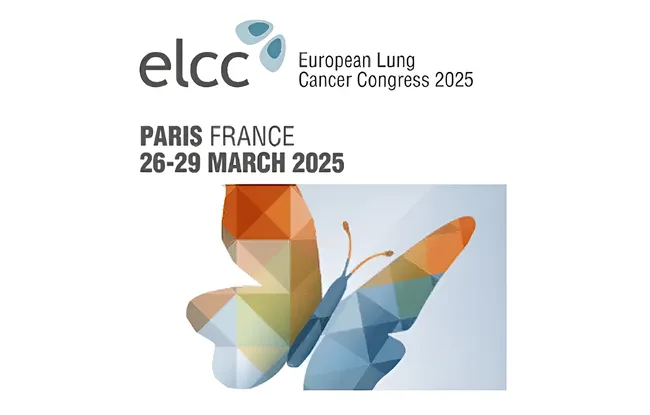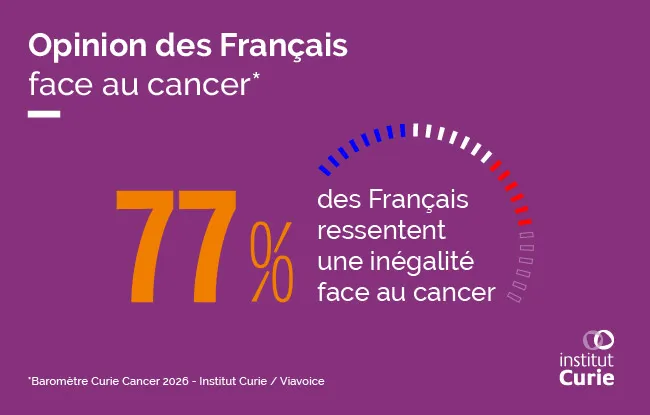- Home >
- Institut Curie News >
- Institut Curie’s latest progress at the European Lung Cancer Congress
This year's European Lung Cancer Congress 2025 takes place in Paris from March 26 to 29. The event brings together the world's leading experts in thoracic oncology, including teams from Institut Curie, who will present promising results in various areas of the fight against lung cancer.
KEY POINTS
Patient Quality of Life / A 70% reduction in skin side effects thanks to preventive treatment in patients with EGFR-mutated advanced lung cancer
Precision Medicine / Innovative personalized treatment for a rare form of lung cancer
Real-Life Data / Neoadjuvant treatment efficacy study replicates clinical trial results identically
Thymus Cancer / Multidisciplinary approaches to this rare and little-known cancer
Lung cancer is the first cause of cancer death throughout the world, with around 1.8 million deaths in 20201 . In France, it is the second most common cancer in men and the third in women, with incidence rising sharply among women. These tumors are often diagnosed at an advanced stage, making treatment challenging. Research and the development of personalized treatment options are essential to improving patient care.
Preventive Protocol Reduces Cutaneous Side Effects in Advanced Lung Cancer by 70%
In around 15% of non-small cell lung cancers (NSCLC)2 , tumor cells have mutations in the epidermal growth factor receptor (EGFR), leading to the development of targeted therapies. A year ago, results from the MARIPOSA phase 3 trial revealed that a combination of a bispecific antibody (amivantamab) and an EGFR-targeted therapy (lazertinib) improved progression-free survival compared to standard therapy in patients with EGFR-mutated lung cancer. At ELCC 2025, Institut Curie will present results from the MARIPOSA study on overall survival, confirming that this combination therapy is a new reference treatment for these patients.
However, anti-EGFR treatments, particularly amivantamab, cause cutaneous side effects (skin eruptions, nail damage, etc.), which are often treated reactively. To prevent moderate to severe dermatological side effects, the randomized phase 2 COCOON study, led by lung specialist Prof. Nicolas Girard, Head of the Medical Oncology Department at Institut Curie, assessed the relevance of prophylactic dermatological treatment in combination with amivantamab and lazertinib.
Preventive treatment included oral antibiotic tablets, lotions, nail antiseptics, and intensive skin moisturizing. Results showed that this optimized, easy-to-use preventive protocol reduced the incidence and severity of dermatological side effects by 70%.
"The COCOON study reveals real benefits for patients. This protocol, already implemented at Institut Curie in collaboration with the Wound and Scar Unit team3 , successfully illustrates Institut Curie's strong commitment to innovation in the service of patients' quality of life," says Prof. Nicolas Girard. "These positive results not only demonstrate a considerable improvement in quality of life but also prolonged treatment adherence for patients who might otherwise have discontinued due to adverse effects; thanks to early, preventive and intensive dermatological care.”
Mini Oral Session - March 27, 2025 Prof. Nicolas Girard / Preventing Moderate to Severe Dermatologic Adverse Events in First-Line EGFR-Mutant Advanced NSCLC Treated with Amivantamab Plus Lazertinib: Early Success of the COCOON Study
Key numbers for lung cancer in France
(source Institut National du Cancer 2024)
- 52,777 new cases diagnosed in 2023 (33,438 in men and in 19,339 in women)
- 30,400 deaths in 2021
- In 2017, the prevalence of lung cancer is estimated at 169,718 people
- Median age of diagnosis: 68 years for men / 66 years for women
- Standardized net survival rate at 5 years: 20%
Risk factors: active and passive smoking, occupational exposure, environmental pollution, personal and family history
Precision medicine: Accelerating Therapeutic Innovation in Rare Forms of Lung Cancer
In almost 3% of NSCLC cases, tumor cells display an alteration in the HER2 receptor, driving cancer cell proliferation. While expression of this receptor is well known to oncologists in breast cancers, its alteration is much rarer and less well known in lung cancers.
The first results of a multicenter phase 1/2 study (SOHO-01), presented at ASCO 2024, evaluated the effect of an inhibitor targeting HER2 in NSCLC. At ELCC 2025, Prof. Nicolas Girard will present results from two expansion cohorts of the SOHO-01 study, confirming the initial findings and supporting continued clinical development of this new treatment. "The promising development of this new treatment once again demonstrates the value of molecular characterization in the development of new targeted therapies capable of changing the game for certain groups of patients," says Prof. Nicolas Girard.
Proffered Paper Session - March 26, 2025 Prof. Nicolas Girard / Phase I/II SOHO-01 Study of BAY 2927088 in Patients with Previously Treated HER2-Mutant NSCLC: Safety and Efficacy Results from Two Expansion Cohorts
A Highly Conclusive Real-Life Study
In 2022, a large-scale international phase 3 study, CheckMate-816, conducted in non-metastatic NSCLC patients, revealed the benefits of combining immunotherapies with chemotherapy before surgery, reducing recurrence and mortality risks by nearly 40%. These findings were presented by Prof. Nicolas Girard in 2022 at the AACR meeting4 .
A study promoted by Institut Curie analyzed real-life data from patients in France treated as part of the CheckMate-816 trial. Presented at ELCC 2025, the findings confirm that real-world results replicated those of the clinical trial (in terms of pathological response rate and number of patients operated on). "These results confirm that real-life data is a major lever for more effective use of marketed treatments while facilitating patient access to cutting-edge therapies," says Prof. Nicolas Girard. “At Institut Curie, real-world data is at the heart of an ambitious strategy aimed at advancing medical research.”
Real-world data is the information contained in medical records, patient feedback collected with the help of questionnaires or connected applications, or even population and administrative data. Coming from the "real world", they reflect the daily lives of patients and hospital departments, and complement clinical trials. By providing evidence from clinical practice, these studies offer insights beyond controlled trial data. Unlike controlled trial data, they integrate the diversity of courses of care and the impact of treatments in real-world conditions. By providing concrete evidence, these studies make it possible for us to evaluate the effectiveness and tolerability of treatments, identify unmet medical needs, optimize and personalize care, accelerate access to therapeutic innovations, and reduce the development costs of new medicinal products.
Poster Session - March 28, 2025 Francesca Lucibello - Pathological response after neoadjuvant chemotherapy (chemo) and nivolumab (NIVO) in resectable non-small cell lung cancer (NSCLC): Initial Results from a French Multicenter Real-World Retrospective Study
Thymus Cancer: An Update on the Management of This Rare and Little-Known Cancer
Malignant tumors of the thymus - the central organ of the immune system located in the upper part of the thorax, between the lungs and below the breastbone - affect around 250 people every year in France. Most originate in the epithelial cells of the thymus and are known as thymic epithelial tumors. Institut Curie is heavily involved in researching and treating these rare, aggressive tumors, which often recur. Institut Curie has unique expertise in the multidisciplinary treatment of tumors of the thymus. The goal is to develop personalized therapeutic strategies such as immunotherapies or targeted therapies to combat rare cancers of the thymus, for which there is currently no effective therapeutic solution. Teams at Institut Curie are also contributing to updating European guidelines for managing thymus cancer.
Additionally, the RADIO-RYTHMIC-01 study is underway to assess the effects of intensity-modulated radiotherapy on post-surgical relapse. This national study, conducted in over 15 centers, aims to enroll more than 300 patients.
Educational session – 27 mars 2025 – Prof. Nicolas Girard / Thymic Epithelial Tumours: What's New in a Multidisciplinary Approach
[1] Source: WHO: https://www.who.int/fr/news-room/fact-sheets/detail/lung-cancer
[2] Among the two main types of lung cancer, non-small cell lung cancer (NSCLC) accounts for up to 80% of diagnoses, the majority of which are non-metastatic.
[3] The Wounds and Healing Unit of Institut Curie is led by Isabelle Fromantin
[4] Press release, April 11, 2022: Lung cancer: a new treatment combining immunotherapies and chemotherapy reduces risk of recurrence and death by almost 40%



